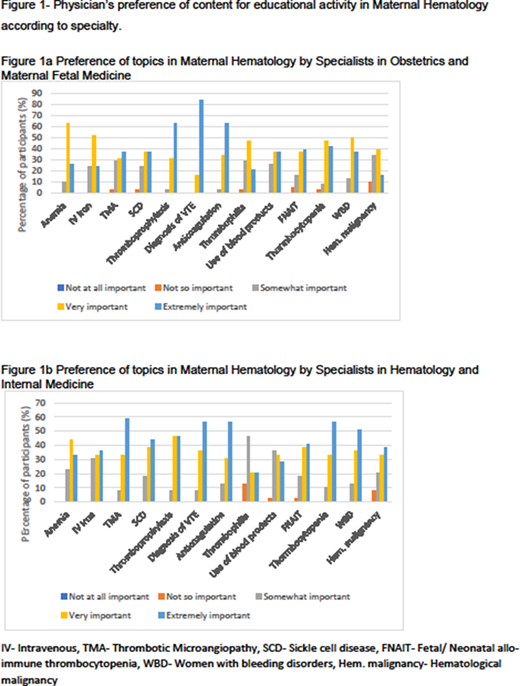Introduction
With advancement in medical knowledge and comprehensive care more women with hematological disorders are proceeding with pregnancy. These women have unique needs during the perinatal period, where the intersection of the Hematological disease and pregnancy can mutually impact each other, resulting in significant morbidity and even mortality. Hematologists, Internal Medicine (IM) physicians and Obstetricians are increasingly faced with the complex care of these women. The aim of this study is to assess the learning needs of these stakeholders in the care of pregnant women with hematological conditions to direct the development of educational activities.
Methods
We conducted a cross-sectional study using a self-administered electronic questionnaire sent to Hematologists, Obstetricians, Maternal-Fetal Medicine (MFM) Specialists and IM Specialists across Canada. The study was approved by the Research Ethics Board of Sinai Health System in Toronto, Ontario.
The questionnaire assessed physician characteristics, physicians' previous educational experiences in Maternal Hematology, self-assessment of knowledge and confidence in managing pregnancy in these women, and preferences for further learning activities in Maternal Hematology.
The questionnaire was pilot tested by two hematology resident physicians and two MFM fellow physicians at the University of Toronto and modifications were made to the survey based on this feedback.
The survey was administered electronically in English in collaboration with the Canadian Hematology Society and Canadian MFM program directors, using an online survey-distributing website, Survey Monkey™. Participation was voluntary and anonymous.
Data were exported into Excel (Microsoft, Redmond, Washington, USA) for statistical analysis. Following overall descriptive analyses (frequencies and proportions), responses were further tabulated by participant specialty.
Results
The survey was administered from December 2019 to March 2020. 97 participants responded to the survey, and 82 (84.5%) completed it. The 15 (15.5%) incomplete surveys (completion of less than 25% of the questionnaire), were excluded from analysis.
Respondents included 17 (20.7 %) MFM specialists, 21 (25.6%) Obstetricians, 34 (41.5%) hematologists and five (6.1 %) IM physicians. Half of respondents had < 5 years of practice (52.6%%) and there was a similar distribution of respondents with 5-10 years (12.8%) and 11-15 years (12.8%) in practice. Most respondents were female (69.6%).
Overall, 38% of respondents described the quality of their prior educational experiences as 'very useful' or 'extremely useful'. Approximately half of the respondents rated their knowledge of Maternal Hematology as intermediate, 25% as beginner and 25% as advanced. The majority of Hematologists and IM specialists (64%) considered their knowledge in Maternal Hematology as 'intermediate'; specialists in Obstetrics and MFM were divided with 30.8% considering their knowledge at the 'beginner' level and 38.5% at the 'intermediate' level. Only 3.7% of respondents described their knowledge level as 'expert'.
Most respondents in Obstetrics and MFM (84.2%) considered knowledge of how to diagnose venous thromboembolism during pregnancy as 'extremely important followed by knowledge of thromboprophylaxis (63.2%) and therapeutic anticoagulation during pregnancy (63.2%) (Figure 1). Amongst Hematology and IM physicians, thrombotic microangiopathy was rated by the greatest proportion of respondents (59%) as being "extremely important". For the format of educational activity, three quarters of the respondents preferred a blended learning program, which would include a combination of face-to-face teaching and technology-enhanced learning activities. Respondents predominantly (76.2%) agreed that learning collaboratively with other specialties in a combined Maternal Hematology program would be helpful.
Conclusion
These results suggest that an interdisciplinary learning program involving collaboration across relevant subspecialties would be preferred by participants for the teaching and learning of Maternal Hematology. A program involving blended (in-person and technology-enhanced) learning modalities was viewed favorably by participants, and should aim to incorporate various topics, which may be prioritized differently amongst specific subspecialties.
Malinowski:Alexion: Other: Advisory board; Alexion: Honoraria. Shehata:Ferring: Honoraria.
Author notes
Asterisk with author names denotes non-ASH members.


